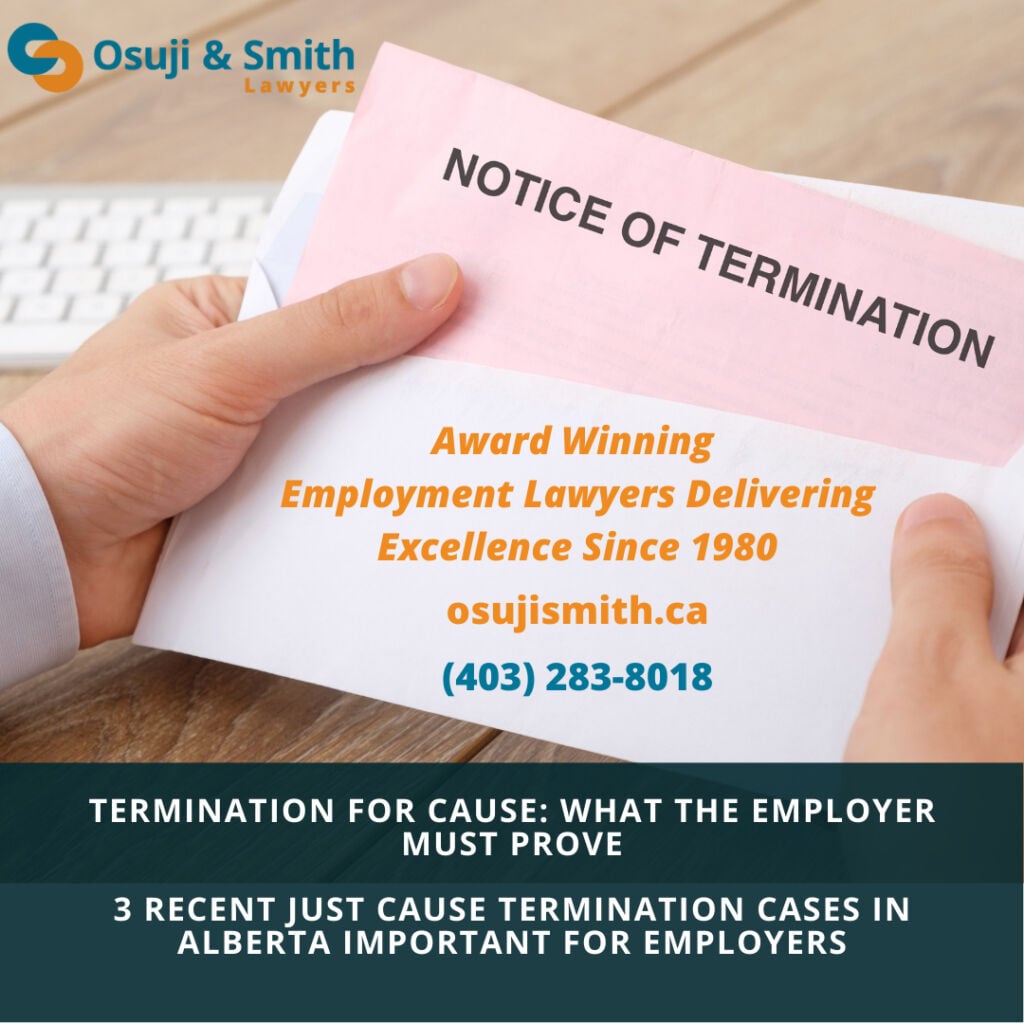TERMINATION FOR CAUSE: What the Employer Must Prove
3 Recent Just Cause Termination Cases in Alberta Important for Employers
Alberta employers are learning the seriousness of proving just cause for termination after three important Court decisions last year. In all three cases, the Alberta Court of Queen’s Bench determined that the employers did not have just cause to terminate their employees.
“Just cause” is not easy to prove, and the onus is on employers to prove it. While each situation is unique, recent history indicates that Alberta courts seem to favour the employee in this type of case.
What is Just Cause Termination?

Just cause termination is when an employer can prove that there is a legal cause for termination and follows the appropriate legal procedure for termination.
Legal cause for termination may be established when the employee has engaged in severe misconduct, gross negligence, or an ongoing pattern of incompetence serious enough to warrant termination. Common behaviour resulting in a just cause termination include:
- Theft or fraud in the workplace;
- Persistent incompetence or negligence in completing assigned duties;
- Harassment or abuse toward other coworkers, clients, or customers;
- A clear pattern of insubordination or intentional non-compliance;
- Off-duty misconduct causing substantial harm to the employer; and
- Engagement in competing business activities causing established economic harm to the employer.
Occasional lateness, unsatisfactory work performance, age, race, gender, or other personal factors are not just cause for termination.
Just Cause Termination in Alberta Courts
In Underhill v Shell Canada Limited, Shell terminated Underhill’s employment for just cause, alleging various instances of serious misconduct. The Court of Queen’s Bench of Alberta concluded that, while Underhill had made some mistakes, there was no evidence of disloyalty or acting in bad faith. Her 17-year history as a dedicated employee and the fact that Shell didn’t suffer significantly because of Underhill’s actions led to the Court’s decision in Underhill’s favour.
In Mack v Universal Dental Laboratories Ltd., Universal satisfied the Court in proving misconduct. However, the Court also determined that Universal had allowed the misconduct by failing to issue any written warnings and failing to follow its performance management process according to its employee policy manual. The Court also concluded that Mack’s misconduct did not warrant termination.
In Baker v Weyerhaeuser Company Limited, Weyerhaeuser alleged that Baker engaged in misconduct and safety violations, including a fire and failure to report the fire. The Court acknowledged that the fire was grounds for discipline, and Weyerhaeuser had properly issued written warning to Baker. Yet the Court concluded that the primary reason for terminating Baker was the supervisor’s personal feelings.
A Caution for Employers About Just Cause Termination
These three cases present an important caution for employers about just cause termination. The context of the termination matters greatly, the issue is complex, and it is remarkably difficult to establish just cause for termination.
The consequences for an employee of a just cause termination are serious. In a just cause termination, the employer is not required to provide termination notice or severance pay, and the employee may be unable to collect Employment Benefits (EI).
Because of the gravity of this, the onus rests on the employer to establish that cause was warranted, and the bar for proving cause is extremely high. If the employer fails to provide sufficient evidence of cause, the termination may be considered wrongful dismissal, and the employer may be liable for damages.
How Employers Must Prove Just Cause Termination
Clearly, Alberta Courts consider termination of employment an extremely serious matter, and employers have a huge responsibility even before a termination happens because history, employment policies, and other factors all impact a decision about just cause for termination.
Employers should have clear, up-to-date policies in place and ensure all employees have a firm understanding of those policies. These policies should include performance expectations and unacceptable behaviour, including how the employer will handle poor behaviour or performance.
Documentation is a crucial component of proving just cause for termination. Employers should keep thorough records of misconduct and other potential grounds for termination, along with written warnings, performance records, and disciplinary history.
Before terminating an employee for just cause, employers must consider context factors, including:
- the workplace culture,
- the nature of the business and the employee’s actions,
- the timing of the employee’s actions, and
- the employee’s length of service, position, and duties.
If the employer can prove that the employee’s conduct or actions are severe enough to undermine the employment relationship, consult with a lawyer. Providing evidence for just cause termination is not easy, and the Court will look beyond the cause by considering the nature of the termination process as well. So proceed with caution.
The recent Alberta cases regarding just cause termination show that, even when employers can prove just cause, the employer must meet further requirements to prevent a case of wrongful dismissal. Employers must exercise extreme caution and consider the risks. Sometimes it may be better to terminate the employee without cause.
CALGARY LAWYERS FOR JUST CAUSE TERMINATION CASES
An employment lawyer can review an employer’s argument and help to determine if a just cause termination is warranted. Consulting with an experienced employment lawyer can limit employer liability and lay the groundwork for a successful termination.
The award-winning employment lawyers at Osuji & Smith in Calgary can provide expert legal advice to employers before proceeding with a just cause termination. Protect your business and get a clear understanding of the legal and financial implications of a just cause termination for your specific situation. We can also help you argue your case for just cause termination in court.



